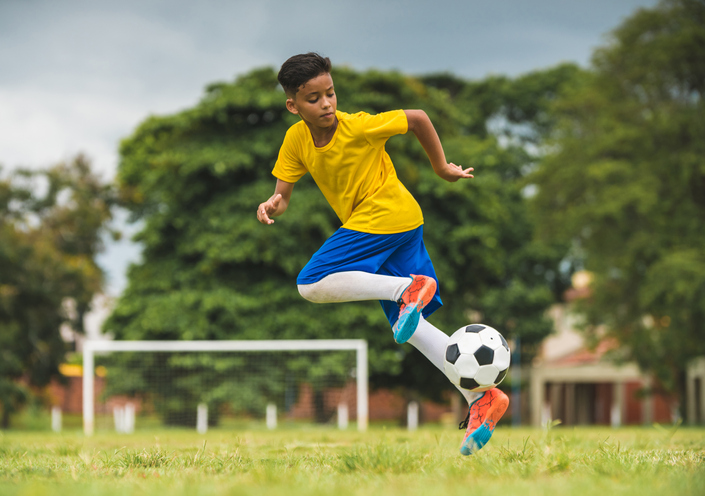By Children’s Health | Contributor
Outdoor workouts, drills and even the more laidback activities can take their toll on athletes during summertime in Texas. And because of the precautionary measures that have been in place due to COVID-19, its likely athletes participating in outdoor activities this summer are even more susceptible to dehydration and heat-related illness than in years past.
“Most of us have been less active, training at a less intense level and are not used the extreme heat,” said Brittany Wehrle, Performance Dietitian at the Children’s Health Andrews Institute for Orthopaedics & Sports Medicine in Plano. “As such, everyone is at a higher risk for becoming dehydrated or developing heat illness as they run, practice, or train outside.”
Wehrle says athletes who take certain medications or those who play sports requiring heavy equipment might be at an even higher risk for heat-related illness.
Wehrle, along with the experts at the Children’s Health Andrews Institute, advise adhering to the following guidelines to limit the risks of dehydration and heat-related illness.
Create a hydration plan
“It’s important to spread your hydration out throughout the day and not just consume liquids while training.”
“This isn’t an exact science, but the goal should be to drink one-half your body weight in ounces throughout the day,” Wehrle said. “It’s important to spread your hydration out throughout the day and not just consume liquids while training. Arriving at practice or a workout fully hydrated is sometimes more important than hydrating during it.”
Wehrle also recommends eating snacks before training that are high in electrolytes and fluids, like salted watermelon or cucumbers, pretzels with juice or water, or a light, balanced meal with fruits or vegetables, and consuming electrolytes during training. She advises bringing a frozen water bottle as well. This can serve as both a source for cold water and as an ice pack to lower body temperature.
“We often hear the terms “heat exhaustion,” “heat stroke” and “heat illness” in Texas, especially over the summer. So, what’s the difference?”
Know the signs of heat illness
We often hear the terms “heat exhaustion,” “heat stroke” and “heat illness” in Texas, especially over the summer. So, what’s the difference?
“Heat exhaustion is the preliminary, less severe level of heat-related illness,” Wehrle said. “Common symptoms of heat exhaustion include, dizziness and fatigue, excessive sweating, clammy skin, a slowed, weak pulse and muscle cramps. For heat stroke, you might experience a throbbing headache, a cease in sweating, your body temperature at or over 103 degrees, a rapid, strong pulse, potential loss of consciousness and even seizures.”
Be vocal
For athletes experiencing signs of heat exhaustion, Wehrle says it’s crucial to inform a coach or athletic trainer right away. Additionally, she advises moving to a shaded or air-conditioned area, utilizing a cold towel to reduce body temperature and hydrating with a sports drink.
Wehrle also says it’s important to ask questions and express potential concerns in any situation.
“No two athletes are the same,” said Wehrle. “If an athlete ever has a question or concern, it’s important to speak with a parent, coach, athletic trainer or sports medicine professional. Many heat-related conditions and other injuries can be prevented this way.”
“No two athletes are the same,” said Wehrle. “If an athlete ever has a question or concern, it’s important to speak with a parent, coach, athletic trainer or sports medicine professional.”
For those who cramp often or have encountered heat illness in the past, Wehrle advises athletes calculate their sweat rate. This can be as simple as weighing yourself before and after training, something the team at the Children’s Health Andrews Institute is currently calculating for its athletes.
Editor’s Note: For more information about the full continuum of care offered at the Children’s Health Andrews Institute, visit Childrens.com/Andrews.
ABOUT BRITTANY WEHRLE:

Brittany Wehrle is the Performance Dietian at Children’s Health Andrews Institute Sports Performance powered by EXOS. Prior to joining the Children’s Health EXOS team, she worked as a sports dietitian at Texas Christian University and the University of Georgia.
Brittany received her Bachelor’s degree from Rice University and completed her dietetic internship at Yale-New Haven Hospital. She obtained her Master of Science in Kinesiology from Texas Christian University. She is also a professional member of the Collegiate & Professional Sports Dietitian Association (CPSDA).


